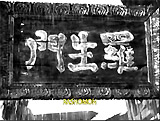
|
Rashomon (1950, Jp.)
In director Akira Kurosawa's cinematic, landmark masterpiece
about the nature of truth and the shaping of perceptions from different
perspectives - the winner of the Best Foreign Language Film Oscar
in 1951, and the Golden Lion award at the Venice Film Festival -
this multi-layered film replayed (in flashback) the same crime story
multiple times from different characters' eyes as they told incompatible,
contradictory tales of the mysterious 'rape' and murder in the
woods in 12th century feudal Japan:
The order of the stories:
- introduction of woodcutter and priest at the Rashomon
gate
- the bandit's story during trial
- the wife's story during trial
- the samurai's story (conveyed through a medium) during
trial
- the woodcutter's version at the Rashomon gate
|
The Four Witnesses
|
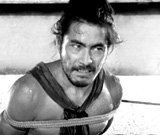
The Bandit/Rapist Tajōmaru (Toshirō Mifune)
|
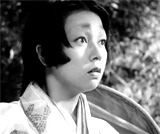
The 'Raped' Wife Masako (Machiko Kyō)
|
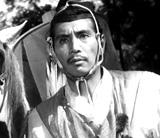
The Murdered 'Samurai' Husband (Masayuki Mori)
(Communicating Through a Female Medium (Fumiko Honma))
|
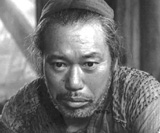
The Woodcutter Kikori (Takashi Shimura) Who Claimed
He Found the Body in the Forest
|
- the film opened under the shelter of Rashomon (the
ruined South gate to modern day Kyoto), during a steady downpour,
as woodcutter Kikori (Takashi Shimura) told a "strange" and "horrible"
story (from three days earlier) to a commoner (Kichijiro Ueda) and
temple priest Tabi Hōshi (Minoru Chiaki)
- the woodcutter had discovered a murdered samurai
nobleman while he was in the woods; in a marvelous moving tracking
shot through the forest, he first found four pieces of
evidence (a woman's reed hat with veil, a samurai's cap, a cut-up
piece of rope, and an amulet case) before he found the body; he reported
his story to the police along with the priest, who reported that
he saw the samurai traveling with his wife the day of the murder
(or suicide); then, they listened to the arrested and captured bandit
who was injured (after being thrown from the samurai's stolen horse)
- the outlaw/bandit Tajōmaru (Toshirō Mifune)
told his version of the story; he watched from the cover of the dense
forest when he glimpsed the wife Masako (Machiko Kyo); she was concealed
under a large hat and veil, while led on a horse by her samurai husband
(Masayuki Mori); when the bandit glimpsed her bare feet and the camera
panned up to partially reveal her face through the open veil, he
was awestruck by the sight and coveted her; he recalled: "I
caught a glimpse and then she was gone. Maybe that's why I thought
I saw a goddess. At that moment, I decided to capture her, even if
I had to kill her man, but if I could have her without killing, all
the better. My intention then was to take her without killing the
man"; the bandit chased after them to confront them; he lied
to the husband and led him deep into the woods where he attacked
him (and tied him with a rope to a pine tree); he returned to the
wife who fully opened her veil to him; he told her the samurai was
sick; she turned pale and looked at him with "frozen eyes";
the bandit changed his feelings about her husband: "When I saw
that, I envied the man and I suddenly hated him"; he dragged
the wife back into the forest, where the wife fiercely defended herself
with an expensive dagger, but then exhausted, she yielded and let
herself be seduced by the bandit ("And so I succeeded in having
her without killing her husband. I still had no intention of killing
him"); the samurai was released and the two men dueled to the
death over the wife's honor (after she begged: "Either you die
or my husband dies...To have my shame known to two men is worse than
dying. I will go with the survivor"); the bandit killed the
samurai, but then the scared wife ran away
|
The Bandit's Tale
|
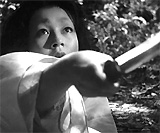
Wife's Defense with Dagger
|
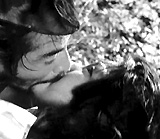
Wife Succumbing to Bandit
|
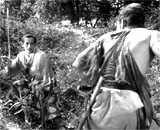
Sword Duel to Death Between Two Men
|
- in the wife's completely contradictory testimony,
the "docile" woman claimed she yielded to the bandit
(while her "horrified" husband was tied up) and then the bandit partially
untied the husband and ran off; the wife was distraught that her
cold and loathing husband wouldn't forgive her; she grabbed the dagger,
cut the remaining ropes, held out the dagger and begged:
"Now kill me. Kill me at once"; as the husband kept coldly
staring at her, she fainted with the dagger in her hand; when she
awoke, she found her husband dead with the dagger in his chest ("I
saw my dagger in my dead husband's chest"); she somehow fled
from the woods and attempted to commit suicide by throwing herself
in a pond, but as she admitted: "I failed to kill myself"
- in the samurai's testimony (via a medium), after the
rape (with her "virtue stained") while the samurai was
still tied up, the wife begged ("Take me wherever you want");
she agreed to join the bandit and asked for the bandit to kill her
husband ("Please kill him. While's he alive, I cannot go with
you. Kill him!"); the bandit was so shocked by his unfaithful
wife's request that he asked the samurai ("What do you want
me to do with her? Kill her or save her?"); the samurai was
ready to pardon the bandit for his crime; at that moment, the wife
fled and got away; the bandit set the samurai free; left by himself,
the samurai committed suicide with his wife's dagger by thrusting
it into his heart, but later, it was missing from the scene of the
crime (someone had removed it from his heart)
- back at the Rashomon gate, the woodcutter's objective
account contradicted the other three stories - he had seen both the
rape and murder (but didn't testify because he didn't want to get
involved); he claimed the bandit begged the samurai's wife to marry
him ("Marry me please! If you say no, I have no choice but to
kill you"), but she refused and instead freed her husband's
rope with the dagger; the samurai told the bandit: "I refuse
to risk my life for such a woman" and called her a "shameless
whore"; the conniving wife called her reluctant husband "weak" and
urged both men to fight for her love ("A man has to make a woman
his by his sword"); when the two men began to duel for her,
she hid her face in fear; the fight was actually not as bold, passionate,
noble or dramatic as the bandit had recounted; however, the outlaw
was able to kill the samurai, and afterwards, the fearful wife fled
from him; as he left the scene, the bandit took the samurai's sword
with him
|
The Woodcutter's Version
|
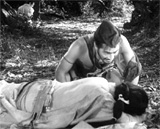
Bandit: "I beg you to be my wife"
|
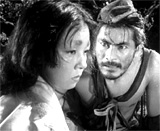
Wife: "It's Impossible"
|
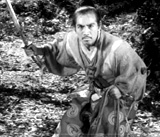
The Men Dueled Over Her
|
- in the epilogue, it was revealed that the reason
the woodcutter was reluctant to testify was because he was also
"a bandit" who had taken the pearl-inlaid dagger from the
murder scene; however, he was redeemed in the eyes of the suspicious
priest when the woodcutter revealed that his motives were not dishonest
or selfish; he decided to adopt an abandoned baby - although he already
had a family of six children: ("Another one wouldn't make a
difference")
- the film's final line of dialogue was delivered by
the grateful priest who had listened to the woodcutter's account
(and saw his selfless act) and had his faith restored in humanity: "No,
I'm grateful to you. Thanks to you, I think I can keep my faith in
man."
|
Epilogue
|
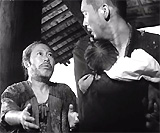
|
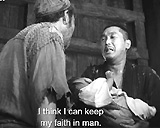
|
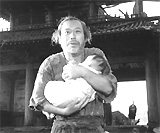
Woodcutter Returning Home with Baby
|
|
Woodcutter's Adoption of Abandoned Baby (in Priest's
Arms)
|
- as the woodcutter walked home with the baby in his
arms, leaving the Rashomon gate, the rainstorm stopped and the
sun began to shine
|
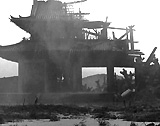
The Rashomon Gate

(l to r): Priest, Commoner, Woodcutter
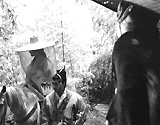
The Priest Testified to Seeing the Wife and Samurai on
the Road
The Bandit's Tale:

The Bandit Watched the Couple

The Wife Concealed Under Veil
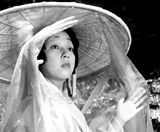
Wife's Face First Revealed to Bandit
The Wife's Tale:
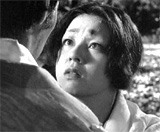
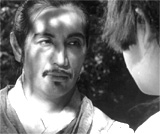
The Unforgiving Husband-Samurai
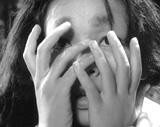
The Shamed Wife
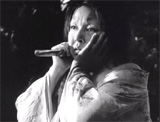
The Wife With the Dagger Asking to Be Killed Before
Fainting
The Samurai's Account:
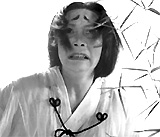
The Medium
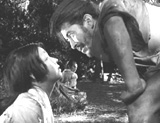
Wife to Bandit: "Take me wherever you want"
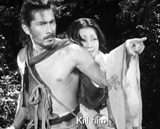
Wife to Bandit: "Kill him"
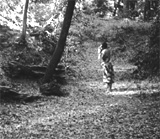
The Samurai's Suicide with Dagger
|















